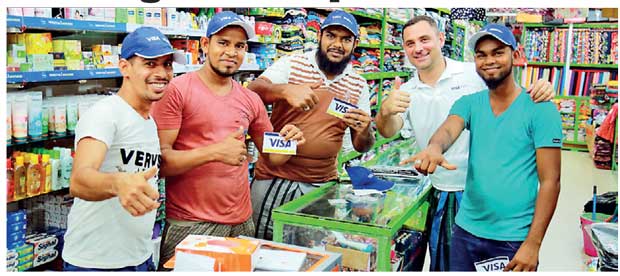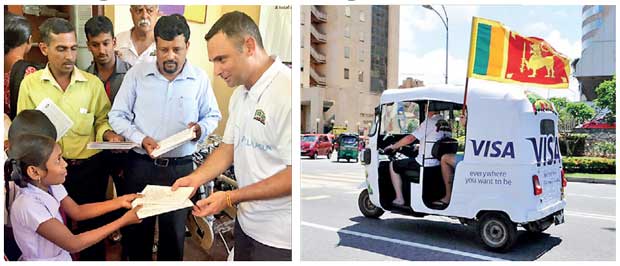27 Oct 2017 - {{hitsCtrl.values.hits}}

Last month, Visa Country Manager for Sri Lanka Anthony Watson travelled 1,168 kilometres around the country on a three-wheeler in the pursuit of going cashless and raising funds for charity as part of the 2017 Pimp My Tuk Tuk challenge.
This is the second year the Pimp My Tuk Tuk challenge has taken place in Sri Lanka and in 2017, the journey saw 52 local and international riders in 26 tuk tuks raise more than US $ 250,000 for local charities across the country.
Commenting on the journey, Watson said, “I feel extremely privileged to have been able to take part in this challenge, which has given me tremendous insight into the local communities across this beautiful country and the opportunity to give back by fundraising along the way.
“Undoubtedly, Sri Lanka offers one of the largest cash displacement opportunities in South Asia. Throughout the trip, we realised the ubiquity of debit cards and credit cards even across some of the more remote areas. Today, there are more than 18 million debit cards and 1.4 million credit cards in circulation, providing around 70 percent of the population with access to a digital form of payment. Combined with 126 percent mobile penetration, I believe Sri Lanka is well placed to become the first South Asian economy to truly transition into a digital economy.”

The Tuk Tuk journey, consisting of a convoy of brightly painted three-wheelers, delivered supplies and supported charity projects all the way from Chilaw to Trincomalee and Hambantota, finally winding up in Galle and Hikkaduwa before returning to Colombo.
Watson’s cashless adventure actually started in Colombo before the charity ride commenced. During this time, he spent two weeks trying to complete everyday tasks that were challenging yet fundamental to conducting an effective cashless journey. From getting a haircut at a local barber, to eating at local restaurants, shopping at markets, paying parking attendants and running errands, these were all tasks that Watson successfully paid for using his Visa card but not before some hurdles had to be overcome.
From buying groceries to even paying the traffic warden at the Colpetty supermarket, Watson was able to understand just how many possibilities there are in the city itself for cashless payments to be made – effectively and easily.
As the charity ride got underway, things became even more challenging. From buying fuel at a petrol station for his three-wheeler, to getting a simple dinner of hoppers and curry, Watson had to walk in search of places that would accept cashless payments.
“In the first town we drove into in the North Western Province, almost 20 local stores I visited only accepted cash. Later, in Chilaw, I found that around 75 percent of the shops deal only in cash. One shop owner told me that for them, cash is a way of life. Clearly this shows the significant potential for expanding access to cashless transactions and for greater engagement with small and medium-scale entrepreneurs and shop owners across the country,” added Watson.
From Chilaw they headed towards the East Coast, where there were smaller shops ready to accept card payments – mostly because of the tourists who visit. From there, as they travelled down to the south and then back to Colombo, Watson was able to learn even more – from opportunity available for cashless payments to be made as a safe, easy mode of payment to empowering local communities with more options of payment than just cash.
The insights Watson was able to pick up on the journey were many but a few stand out as noteworthy not only for the financial sector but also for Sri Lanka as a growing market with potential for the expansion of the digital economy.
Watson believes that when it comes to understanding the benefits of cashless payments, consumer education is important.
“People will benefit from knowing just how safe and convenient cashless payments can be. They need to know how simple and easy making a payment by card is today.”
A key insight was the ease with which the younger generation was able to connect with the digital economy. “With their smartphones, they had access to the Internet and knew how to make online payments. They were also using the opportunity to educate the older generation of business owners on the possibilities of technology.”
As the usage of smartphones and Internet grows throughout Sri Lanka, so will the willingness on the part of consumers to embrace technology.
“Various business models and apps being used are going to change the landscape for payments in Sri Lanka. There is likely to be a surge of growth in digital payments in this manner.”
Watson says that the power of kindness that he saw on his journey was an experience that touched him – from the ex-serviceman, who volunteered to take him on the motorcycle to a petrol shed and then bring him back to his stranded three-wheeler with fuel in a bottle and refusing to be compensated for it, to the shop owners, who went that extra mile to make sure he could actually make a cashless payment – even if it meant borrowing another shopkeeper’s POS terminal.
“Digital transformation is bringing Sri Lankans closer to one another in the community and also to the world,” he says.
On the whole, the journey yielded the kind of insights that Watson believes would empower the community, fintechs and the country itself – accelerating the growth of electronic payments is very much a topic of relevance for Sri Lanka.
25 Nov 2024 48 minute ago
25 Nov 2024 1 hours ago
25 Nov 2024 1 hours ago
25 Nov 2024 2 hours ago
25 Nov 2024 3 hours ago